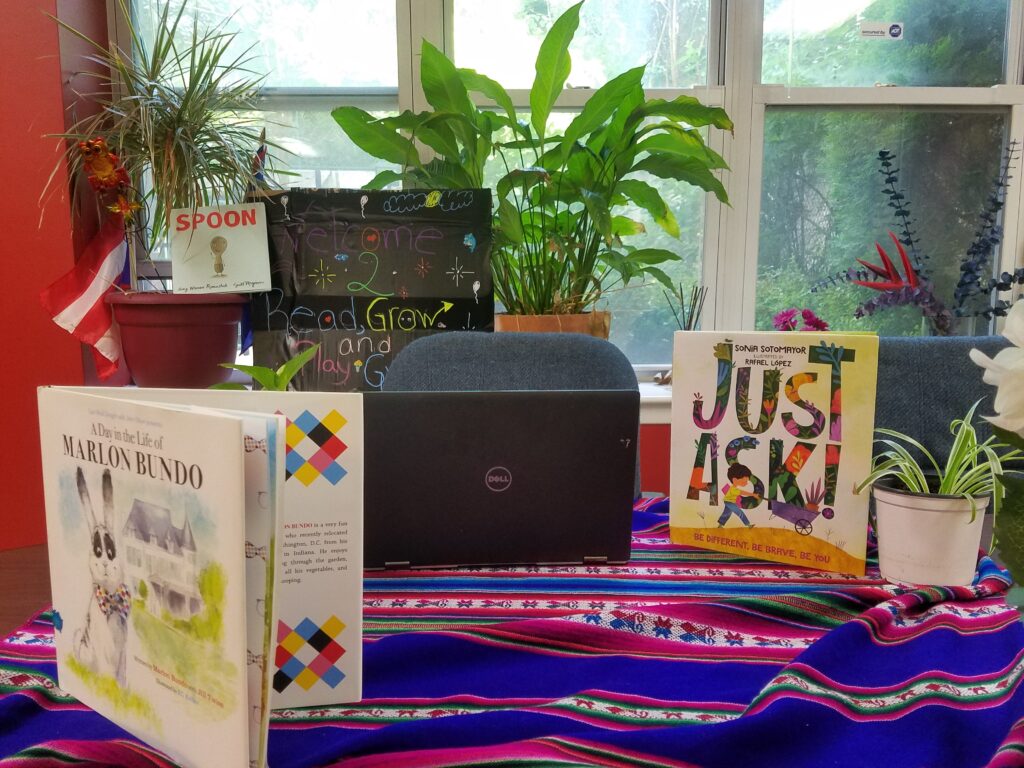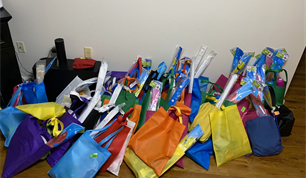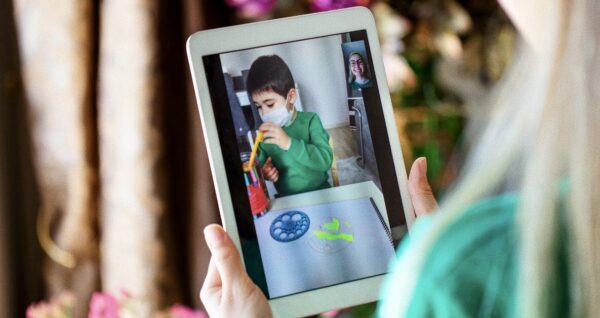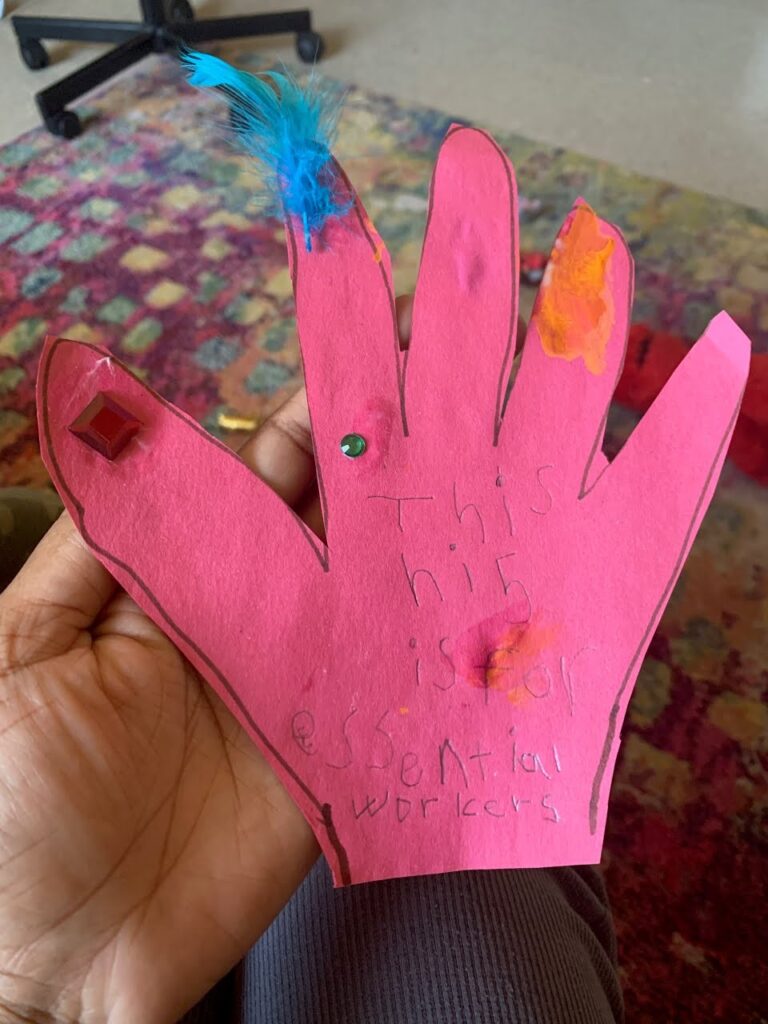Thanks to our staff and clients’ commitment, Sanctuary’s CFSP has been able to provide therapy and support to families despite the challenges brought on by the COVID-19 pandemic.
The ramifications of the shelter-in-place orders made necessary by the COVID-19 pandemic have been universally challenging, particularly for children and those who support them. As New York shut down to stop the spread of coronavirus, staff and the families working with our Children and Family Services Program (CFSP) worried how the agency’s shift to remote service provision would impact their counseling sessions. Many clients lacked privacy at home, had little or no access to tech devices, and/or had limited internet and mobile data. However, our staff moved quickly—reaching out to families to determine the safest and most effective ways to communicate, developing safety plans, and purchasing communication and tech devices whenever possible—to ensure continued support while the program shifted to teletherapy. Today, six months into the pandemic, we are proud to share the ways in which CFSP has adapted and overcome these obstacles to make sure our clients could continue to attend counseling sessions in these times of greater need.

During the first few weeks “there was a lot of hesitation and even anxiety with parents, kids, and staff” related to having counselors enter clients’ homes virtually, said Estrella Perez, our Clinical Supervisor at the Manhattan Family Justice Center. Before COVID-19, clients would come into our office where counselors would have full control of the environment. But doing virtual work “throws that control out the window,” says Ines Cano, Program Director of Sanctuary’s Non-Residential Services. Often times, she explains, there will be other family members present in the room where the client is engaging in virtual counseling. According to Kimberly Neill, CFSP Clinical Supervisor at our Manhattan Office, this lack of privacy has been one of the greatest challenges for clients who still share their home with an abusive family member.
Nonetheless, we have seen many positive outcomes emerge during these unprecedented times. The shift to virtual counseling has made it easier for clients—many of whom missed in-person sessions due to transportation issues—to meet with their counselor for their scheduled sessions with much more consistency. The families CFSP is working with “have also been able to share their homes with us and the things that they have there,” Kim said, helping counselors gain a deeper understanding of the obstacles and strengths their clients live with each day. In many cases, virtual counseling has helped folks feel more comfortable and be more open during sessions. “Some of the boundaries have been broken down,” she acknowledged, “and we are all being a little more our full selves all the time.”
“I brought up recently that our clients never say they are ‘fine’ anymore (a common answer for ‘How are you?’) Instead they are more honest about the highs and lows of their week. It is a terrible price to pay but there are positive things during this time too.” — Kimberly Neill, CFSP Clinical Supervisor
When it comes to our younger clients, Ines says “there are sessions that are amazing and there are sessions that are full of challenges.” She says that various factors—like the child’s age, whether the space is conducive for the child to focus on the counselor, what equipment is being used, and a parent’s access to and comfort level with technology—play a role in how these go. It’s difficult to engage kids ages 3-6 given their very short attention spans. At times, children will run around the room while the counselor is trying to speak to them over video or phone. “We often need parental assistance to engage with them,” Kim told us. “I have done a few sessions where I talk to a child who is doing a headstand during our meeting.” Of course, there are also wonderful moments that bring great joy to both kids and counselors. “Children have been excited to show us their spaces, toys, or siblings.” Ines shared. “It gives us insight into their lives in ways that we wouldn’t have had before.”

With children in the 7-12 age range, our counselors have had greater success connecting through TheraPlatform, a teletherapy platform that provides games, interactive drawings, videos, and stories. Kim says working with older kids has been a lot easier as they “tend to know how to use the tech and are less likely to decide to show us the inside of their noses on video.” Some kids have felt a little self-conscious and preferred to do sessions over the phone rather than through video, but many have been excited to enter the counselor’s home and find that they are surviving COVID together.
Kim says that under this new framework, setting tech communication boundaries with clients has certainly been important. There have been situations that have pushed many counselors outside of their comfort zones, but Estrella and others say that, overall, navigating virtual counseling has been a bonding experience for counselors and clients. Ines even admits that at times, children have taught her how to use technology which in turn allows them to feel masterful and proud of themselves. According to Jenn Sanchez, CFSP Clinical Supervisor, the best part of it all is “being able to take joy in hearing some of [the kids] own success stories like making it through this crazy school year and still receiving passing grades or graduating.”

Overall, COVID-19 has pushed CFSP counselors and childcare providers “to think even more creatively about how we interact and the tools we have on hand,” according to Kim. Over the past few months, she and her team have worked tirelessly to create an online library of our in-office books to use with clients, as well as a public drive with information for families and activities for children. Echoing Kim, Jenn also spoke proudly about “all the creative ways that our team has pulled together to develop workshops, provide out resources, offer assistance to get particular supplies delivered to help our children keep some sense of enjoyment, normality, and structure in their lives.”

Thanks to our staff and clients’ commitment, Sanctuary’s CFSP has been able to provide therapy and support to children and families experiencing or healing from the trauma of domestic violence, despite the challenges brought on by the COVID-19 pandemic. “I can honestly say that I have been so inspired and hopeful with the work our CFSP staff have been able to achieve with clients,” Kim says, “and with the willingness of clients to continue to trust in us through hardship . . . I think in many ways this time has brought us closer, as we all recognize we are in this together, doing the best we can each day.”
—
While Coronavirus has largely spared the young, children—especially those in low-income households—stand to bear the brunt of the pandemic’s long-term impacts. We extend our profound gratitude to French-American Aid For Children for its extraordinary 2-year grant to help us meet a wide range of emotional, health, and urgent basic needs of children recovering from the trauma of abuse amidst the pandemic, as well as other generous funders who help make Sanctuary’s Children & Families Services Program possible, including support for the transition to remote clinical services during COVID-19:
Breaking the Cycle Foundation
Child Welfare Fund
The Leir Foundation
The Marks Family Foundation
Monday.com
The Joseph Leroy & Ann C. Warner Fund
Sony Corporation of America
The Sunshine Foundation
.
Learn more about Sanctuary’s Children & Family Services here.




